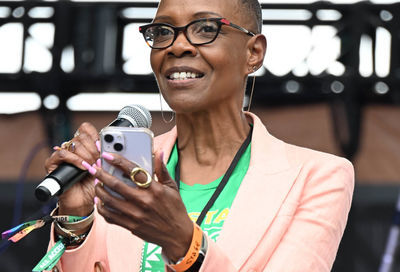Prince: Ranking His Albums, Bottom to Top
 23. Rave Un2 The Joy Fantastic (1999)
23. Rave Un2 The Joy Fantastic (1999)
1999 was gonna be Prince’s year. After all, he claimed ownership over the eve of the changing millennium seventeen years prior with his iconic single. As the year approached, anticipation mounted when news hit that Prince had signed a deal with Clive Davis and Arista Records to distribute his new album and provide a real promotional push, something that had been lacking with Prince’s recent output. Unfortunately Rave Un2The Joy Fantastic wasn’t the huge comeback fans, and no doubt Prince himself, had craved. There are a handful of tracks that stand out as among Prince’s best of the ‘90s — two of them beautiful and bitter ballads: “Man o’ War” and “I Love U, But I Don’t Trust U Anymore.” Rarely, if ever, has Prince sounded so vulnerable and genuinely hurt as he does here. There are also a couple terrific and commercial guitar rockers – the upbeat “Baby Knows” and the duet with Gwen Stefani, “So Far, So Pleased.” Unfortunately Prince (or Arista) chose one of the weaker tracks as lead single: the soulless, plastic “The Greatest Romance Ever Sold.” The album is further marred by an ill-advised cover of Sheryl Crow’s “Every day is a Winding Road,” and by throwaways like “Silly Game” and “Hot Wit U.” It’s also burdened with an unwieldy title and a cover with Prince in a bizarre skin-tight shiny blue get-up that looks like something out of The Fifth Element… not a combination designed to propel him back into the upper reaches of the pop charts. It was a missed opportunity. The material was there — trim some of the fat, release the right singles (“Baby Knows” followed by “So Far, So Pleased” and “Wherever U Go, Whatever U Do” or “The Sun, The Moon and Stars”) and try another direction with the cover and title and it might have been the hit Prince obviously so desperately wanted. ‘Twas not to be, but there’s a truly strong Prince album in there somewhere. (Oh, and speaking of 1999, we’re all going to pretend that the “1999 – The New Master” single never happened, right? It’s just better that way. Some things are too painful to revisit.)
 22. Batman (1989)
22. Batman (1989)
Tim Burton’s Batman, starring Jack Nicholson, Michael Keaton and Kim Basinger, was the perfect project for Prince to regain his momentum after Lovesexy’s disappointing chart performance. From a commercial standpoint, it was the right move. Prince’s Batman, comprised of songs featured in or inspired by the film, shot straight to #1 and spent six weeks at the top over the summer of 1989. It was buoyed by first single “Batdance,” an electro-funk suite featuring bits and pieces of dialogue and snippets from other tracks on the album. “Batdance” became Prince’s fourth #1 single in the U.S. Unfortunately, the rest of the album is hit-and-miss. The second single “Partyman,” which was featured during a key scene in which the Joker and his henchman deface priceless artwork, is a fun and funky slice of pop. “The Arms of Orion,” a duet with Sheena Easton, is a pretty if slightly saccharine ballad. There are some problems, though. The production sounds more dated than most of Prince’s output, and there are a couple weak points — most notably “Lemon Crush” which features this unforgivable couplet: “If I’m working’ at my jobba, I’m the victim, you’re the robba.” Yeah… That one should have stayed in The Vault. Also problematic is the big falsetto ballad, “Scandalous” — it’s overlong, and Prince’s screechy vocal performance is like nails on a chalkboard. Batman has its moments, but ultimately it doesn’t approach Prince’s best work of the decade and even though it returned him to the top of the charts it’s his weakest ‘80s album by a wide margin.
 21. Planet Earth (2007)
21. Planet Earth (2007)
Prince’s 2007 album Planet Earth is much like Musicology in that it’s a diverse collection that hits on just about all of the styles for which he is known. Planet Earth begins with the dramatic title track, a grandiose piece with real drama and power. First single “Guitar” is a fairly standard rocker, similar to “Fury” from the superior 3121. There are a couple nice ballads, particularly “Somewhere Here on Earth.” “The One U Wanna C” is a likable pop-rocker in a similar vein as “Cinnamon Girl” or “I Could Never Take the Place of Your Man.” “All the Midnights in the World,” sounds like it should have come out during the Parade era, and the funk workout “Chelsea Rodgers” is the highlight of the album’s second half. Wendy & Lisa provide backing vocals on “Lion of Judah,” and it’s great to hear them on a Prince record again. A couple tracks have some cringe-worthy lyrics, particularly “Resolution” and “Mr. Goodnight,” but really there isn’t anything too awful on Planet Earth. There is also nothing that really pushes the envelope of Prince’s genius. Planet Earth is Prince on auto-pilot, and while that might result in an album better than what most artists could hope to produce, it’s not the kind of album likely to get Prince’s fans too revved up. There’s nothing here he hasn’t done before, and better.
 20. Musicology (2004)
20. Musicology (2004)
Prince’s big commercial comeback, Musicology hit with a splash in 2004. It was the 20th anniversary of Purple Rain. He’d changed his name back to Prince from that bizarre symbol a few years prior, and he was inducted into the Rock n’ Roll Hall of Fame in his first year of eligibility, surprising no one. During the show’s jam session, he delivered a blistering guitar solo on The Beatles’ “While My Guitar Gently Weeps” that reminded everybody just how fucking great he actually is. It had been years since Prince was a real presence nationally, but Musicology and the tour that supported it changed that. The album climbed all the way to #3 on the Billboard Top 200, his highest placement since Diamonds and Pearls thirteen years earlier. If only the album had been stronger he might have been able to really amp things up, but in the end it’s only an average Prince album (which means it’s better than 90% of anything else out there, but still…) There’s nothing average about the title track, a funky tribute to old-school soul that is a classic Prince single — it should have performed much better on the charts. The rich soul ballad “Call My Name” earned him a Grammy for best Male R&B Performance. The sweetly nostalgic “Reflection” ends the album with real grace and feeling. There’s only one real miscalculation, the vapid “Life ‘O’ The Party”, but much of Musicology is in that good-but-not-great zone in which Prince has too often inhabited since his ‘80s peak.
 19. The Black Album (1987/1994)
19. The Black Album (1987/1994)
The much mythologized Black Album was supposed to be released in late ’87. A raunchy collection of down and dirty funk, the plan was to release it with no name, no label, just landing in stores without any commercial consideration. A novel gimmick. Of course, as the story goes, Prince at the last minute cancelled it because he had a change of heart over its explicit material. The fact is that the album never would have lived up to the hype it had generated had it been released. A new Prince album of full-throttle raunchy funk, like an updated Dirty Mind? Then yeah, that would have done the trick; but that’s not what The Black Album is. It’s really a cobbled-together collection of so-so material by Prince’s ‘80s standard. But once it was pulled at the last minute and left unreleased… suddenly everybody is dying to get their hands on it. That a loose collection of mostly throwaway material became one of the most famed bootlegs ever is pretty amazing. There are some strong moments, though… “Superfunkycalifragisexy” and “Cindy C” are high energy funk, and the lascivious “Rockhard in a Funky Place” sounds like it would have made a great B-side from a Sign ‘o the Times-era single. After being shelved in 1987 with the eventual release of the much better Lovesexy, The Black Album finally saw the light of day in 1994 as part of his deal with Warner Bros. to get out of his contract, but by that time it was stale and dated, and everybody who wanted it had a bootleg copy anyway. It limped to #47 on the Billboard Top 200 and quickly went out of print. The Black Album’s mythology and reputation far outweigh its value as a collection of great Prince music.
 18. Diamonds and Pearls (1991)
18. Diamonds and Pearls (1991)
After the disappointing Graffiti Bridge project yielded a film that was a fiasco and only one substantial hit (“Thieves in the Temple”), Prince aimed to get his commercial mojo back. Diamonds and Pearls proved that he could still connect with wider audiences. A return to a more R&B influenced sound, Diamonds and Pearls was loaded with commercial material and yielded his fifth and final (thus far) #1 single, “Cream.” The title track, an ornate ballad featuring significant vocal contributions from Rosie Gaines, was a major hit and the socially-conscious “Money Don’t Matter 2Nite” hit the Top 40. The album’s highlight, though, was its first single, the audacious and sexy hip-hop influenced “Gett Off,” a track that suddenly rendered Prince cool again beyond his hard-core fan-base. Unfortunately there are a few blunders, most notably the much-despised “Jughead,” a straight-up rap track performed by Tony M., whose input on Diamonds and Pearls and the follow-up O(+> is widely (and rightfully) derided by fans and critics. Fans were glad to see Prince gain some commercial success again, but many were perturbed by the increasing influence of hip-hop on his music, which didn’t seem a natural fit for him. Prince was always one to start trends, not follow them, and his forays into hip-hop and rap — with a couple notable exceptions — generally sound like a square peg trying to jam itself into a round hole. Diamonds and Pearls has more strong material than weak, and some truly outstanding moments, but it doesn’t reach the lofty heights of his best ‘80s work.
 17. Graffiti Bridge (1990)
17. Graffiti Bridge (1990)
It’s easier to enjoy Graffiti Bridge if you pretend that its accompanying film is only a bad dream brought on by too much purple punch. Despite its association with a film that is, let’s face it, unwatchable, the soundtrack is quite good. Most of the material had been sitting around for years, but that doesn’t make it any less compelling. George Clinton himself guests on “We Can Funk,” which is appropriate as the song is clearly an ode to the legend’s work with Parliament & Funkadelic. People talk about Prince’s many gifts as a songwriter, vocalist, musician, and performer, but his genius as a producer and arranger is often overlooked. The vocal arrangement on “We Can Funk” is a prime example — just listen to it build as it reaches a shrieking climax, layer upon layer of sound all working together to form a euphoric cacophony. The gospel-flavored ballad “Still Would Stand All Time” is another example of Prince’s deft touch in handling vocal arrangements. The haunting, atmospheric “The Question of U” and “Joy in Repetition” both feature blistering guitar work. “Thieves in the Temple,” a late addition to the project, became the first single and a Top 10 hit, but the follow-up — the energetic funk/pop “New Power Generation” — failed to catch on with audiences (the annihilation of the movie by critics and its disastrous box office performance likely didn’t help). The album did yield a surprise hit for young Tevin Campell, singing lead on the track “Round and Round.” “Can’t Stop this Feeling I Got” and “Elephants and Flowers” are strong tunes worthy of consideration as singles. Unfortunately Graffiti Bridge contains two of Prince’s worst tracks — the embarrassing “Tick, Tick Bang,” and the sweetly saccharine title song that’s trite and irredeemably cheesy. But despite that, Graffiti Bridge has too much great material to overlook.
 16. Emancipation (1996)
16. Emancipation (1996)
This was the album that Prince fans had been eagerly anticipating for years. Finally, emancipated from Warner Bros, as illustrated by the cover image of chains being burst apart. Finally free to do what he wants, how he wants, and as often was he wants. Three full CDs of new material — each one exactly 60 minutes. Three hours, 36 new Prince songs… what could possibly go awry? It turned out to be more complicated than any Prince fan imagined. Emancipation occupies an odd and painful space in Prince’s discography. It’s an awkward listen at times, as the album heavily emphasizes his relationship with Mayte Garcia and the impending birth of their child. As we know in retrospect the relationship was doomed, and the child would not survive — which makes the joyous “Let’s Have a Baby” particularly heartbreaking, and devotional love ballads like “Friend, Lover, Sister, Mother/Wife” bittersweet. “Sex in the Summer,” which even features a sample of a recording of the baby’s heartbeat, now seems oddly creepy. That said, there are plenty of great songs on Emancipation; unfortunately the plastic, too-pristine, soulless production that plagues most of the album hampers it. High points include “Sleep Around,” “Somebody’s Somebody,” “The Holy River,” “Curious Child,” “Dreamin’ About U,” a sublime cover of The Stylistics’ “Betcha By Golly Wow!” and the prescient “My Computer” which features backing vocals by Kate Bush. There are some real miscues as well… “We Gets Up,” “Mr. Happy,” and “Da Da Da” are at the top of that list. Despite the presence of ultra-commercial material, Emancipation didn’t do as well as Prince fans might have hoped. At the time Prince was out of favor with the general record buying public, largely because of his name change to an unpronounceable symbol, and the promotion behind the album was spotty. The bottom line with Emancipation is that, despite the dated production and some painfully awkward moments relating to his personal life, the strong material far outweighs the weak, and under different circumstances it might have been a huge album for Prince.
Support Metro Weekly’s Journalism
These are challenging times for news organizations. And yet it’s crucial we stay active and provide vital resources and information to both our local readers and the world. So won’t you please take a moment and consider supporting Metro Weekly with a membership? For as little as $5 a month, you can help ensure Metro Weekly magazine and MetroWeekly.com remain free, viable resources as we provide the best, most diverse, culturally-resonant LGBTQ coverage in both the D.C. region and around the world. Memberships come with exclusive perks and discounts, your own personal digital delivery of each week’s magazine (and an archive), access to our Member's Lounge when it launches this fall, and exclusive members-only items like Metro Weekly Membership Mugs and Tote Bags! Check out all our membership levels here and please join us today!
























You must be logged in to post a comment.